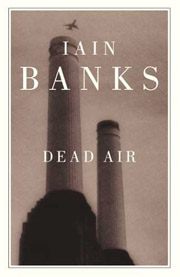
![]()
|
Index
•
|
|
Welcome
•
|
|
21st Century•
The Future |
|
World
Travel•
Destinations |
|
Reviews•
Books & Film |
|
Dreamscapes•
Original Fiction |
|
Opinion
& Lifestyle •
Politics & Living |
|
Film
Space •
Movies in depth |
|
Kid's
Books •
Reviews & stories |
|
|
|
|
The International Writers Magazine - Our Tenth Year: Our TImes
Dead Air by Iain Banks
Publisher: Abacus; New edition edition (3 Jul 2003)
ISBN-10: 0349116644
ISBN-13: 978-0349116648
• Callum Graham
Iain Banks is not necessarily the obvious choice to pick as a writer who embodies the spirit of our times. However, after reading his novel Dead Air I found him to be a prime candidate.
The book focuses around Ken, a ‘shock jock’ on London commercial radio station ‘Capital Live!’, who finds himself increasingly imperilled by his dangerous lifestyle. Affairs, drinking, drugs and his controversial views, as well as the odd bit of well meaning good citizenship get him into a lot of trouble with his boss, past and present girlfriends, angry London gangsters and his best mates.
Whilst Ken and various guests are dropping inanimate objects of the balcony of an eighth floor party, planes are hitting the Twin Towers. Within minutes every ones mobile phone are ringing to gossip about the shocking news and the television is switched on to watch the aftermath. From this ‘rubberneck’ moment onwards Iain Banks captures, through the cynical eyes of Ken, the epitome of now.
There has been plenty of fiction produced post 9/11 which is set around the terrorist attacks on the World Trade Centre or some similar event. However, Iain Banks’ novel side steps this whilst still highlighting it as a key moment of the 21st century.
It is Surprising (when considering the title) that after the opening chapter, where Ken finds out about the attack, Iain Banks does not pursue this as a main plot thread. Life continues as normal. It is only the thin tendrils of post 9/11 paranoia which creep in to the narrative. As Ken says, when discussing how the public have become more suspicious on the tube, "People have started eyeing each other; especially anyone carrying anything … big enough to be a bomb".
The plot seems to move, not because of, but in spite of global terrorism. Iain Banks looks more at the effects, such as the media’s caginess to deal with the issues of reporting the events on radio, the effects on the public and the general climate of Britain after the events, without getting wrapped up in the hysteria of it. Perhaps this is because, like many of Iain Banks previous characters, Ken is originally from Scotland and see’s himself more as an outsider looking in.
By noting these little changes which appear to have happened to England over night Iain Banks captures perfectly a snap shot of every day Britain. He also creates a picture of the British relationship with America. If the planes had been flown into the Petronas Twin Towers in Malaysia would we have given it as much media coverage?
However, it is not just the above which makes Dead Air irrevocably the here and now of the 21st century. It is the way that Ken as a broadcaster lives and works. Iain Banks successfully contextualises our time period through the voice of Ken on his radio shows. This is done with mentions of the IRA threat from the 70’s to the 90’s, commenting on the now familiar removal of bins from train stations. Ken’s radio tirades also cover the Israeli/Palestine conflict which although has been going on for centuries is just as relevant now as it has ever been. He even comments on his scepticism of those who are against the EU, or as he calls them ‘Europhobes’, and the infringement of CCTV into personal freedoms; all very current issues today.
A lot of Ken’s personal life seems symptomatic of modern culture. For instance the tabloid journalism which follows him from home to work (Diana is mentioned), the frustrations of advertising on radio (as well as a hint at the joys of an advert free BBC) and his resistance of the growing influence of Sky as part of the effects of increasing globalisation. His recreational activities of drugs and sex are also very of this time. Maybe not so much in the context of the novel, as this ‘rock and roll’ lifestyle has become normalised over the last 40 years, but more because of the extent that Iain Banks can openly write about it.
The book does cut out a lot of day to day living, jumping from event to event swiftly, but that is only what people in the present do to the past anyway. Iain Banks is, while creating an enjoyably thrilling novel, nicely condensing our present in his own way for the future to read. Maybe Iain Banks will not be the Dickens of the 21st century but you can be sure that his dog eared novels will still be squashed up on the dusty book shelves of fans for many years to come, both for this generation to wistfully thumb through and for the next generation to take some lessons from.
© Callum Graham January 2009
callum.graham@btinternet.com
© Hackwriters 1999-2009
all rights reserved - all comments are the writers' own responsibility - no liability accepted by hackwriters.com or affiliates.

